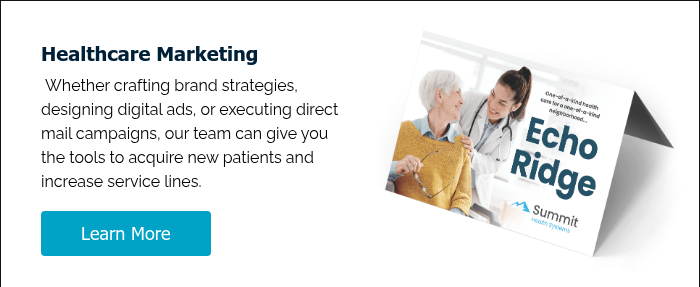Why Full-Funnel Marketing Is Key to Healthcare Success
Streamworks Blog
%20(1).jpg?width=1000&height=500&name=TackthumbBlogPhoto-(1)%20(1).jpg)
In healthcare, a patient's journey is unique, often complex, and influenced by many stages before making a decision. Full-funnel marketing—addressing every step of a consumer’s journey from awareness to conversion and retention—allows healthcare organizations to connect meaningfully at every stage. The conversion funnel serves as a visual metaphor for the patient's journey, illustrating how the number of potential patients decreases at each stage from initial awareness to becoming loyal patients. After understanding the stages of the journey, marketing funnels can be seen as strategic models that guide potential patients through awareness, consideration, and decision-making processes. By embracing full-funnel marketing, healthcare providers can effectively build awareness, nurture trust, and support patients in making informed decisions. Here’s why this approach is key to healthcare success.
Introduction to Healthcare Marketing
Healthcare marketing is an essential pillar of the healthcare industry, empowering healthcare providers to connect with potential patients and guide them through every step of their healthcare journey. For healthcare marketers, understanding the unique needs and motivations of healthcare consumers is crucial to developing effective marketing strategies that drive patient acquisition and foster long-term relationships with satisfied patients. By leveraging digital marketing strategies, healthcare organizations can create awareness, educate potential patients about their health options, and build trust that leads to lasting patient-provider relationships. In today’s competitive landscape, healthcare marketing is not just about promoting services—it’s about supporting patients, building credibility, and ensuring that every interaction adds value to the patient experience.
Understanding the Healthcare Marketing Funnel
The healthcare marketing funnel is a strategic framework that maps the patient journey from initial awareness to long-term retention. This funnel is divided into several key stages: awareness, consideration, conversion, and retention. At each stage, healthcare marketers must craft targeted messaging and select the right channels to address the evolving needs and concerns of potential patients. By understanding the healthcare marketing funnel, healthcare providers can optimize their marketing efforts to improve patient engagement, increase patient acquisition, and nurture ongoing relationships. Each stage of the funnel presents unique opportunities to connect with patients—whether it’s introducing your services, providing in-depth information, or supporting patients after their visit. Mastering the different stages of the marketing funnel ensures that patients receive the right information at the right time, enhancing their overall experience and satisfaction.
1. Capturing the Attention of a Diverse Audience
The top of the funnel focuses on creating awareness among a broad audience, including prospective patients who are just beginning their search for healthcare information. Potential patients often seek health information passively through social media, online articles, or digital ads across multiple channels and digital platforms. For healthcare marketers, this is a chance to showcase expertise and provide educational content that resonates by leveraging social platforms to distribute reliable healthcare information. Full funnel marketing helps healthcare providers establish a presence where audiences are already looking for information, and by sharing reliable health content, they build trust from the outset.
2. Nurturing Trust through Consideration Content
Once awareness is established, potential patients begin actively searching for solutions. This consideration phase is critical in healthcare, as trust and credibility become deciding factors, with building trust being a key objective. Full funnel marketing enables healthcare organizations to provide valuable content that deepens engagement by highlighting the expertise of healthcare professionals and the range of health services and medical services offered—such as patient testimonials, educational videos, or expert articles that demystify complex treatments. This builds confidence among patients who are now aware of your organization and are seeking to understand more about how you can meet their needs.
3. Driving Action with Targeted Conversion Tactics
In healthcare, converting a potential patient often means scheduling an appointment or filling out a contact form, effectively converting prospects into a new patient. Conversion-focused marketing at the bottom of the funnel, or sales funnel, such as personalized email reminders or easy appointment booking systems, helps prompt these actions. Full funnel marketing ensures that the potential patient’s journey is seamless, so when they’re ready to make a decision, the process is simple and supportive. Targeted marketing campaigns at this stage are designed to maximize conversion rates and support the transition from prospect to new patient.
4. Building Patient Loyalty and Advocacy
A successful healthcare journey continues beyond conversion; post-care communication is essential. Full funnel marketing includes retention strategies like follow-up emails, satisfaction surveys, or personalized health tips that support long-term relationships. These efforts enhance patient satisfaction and encourage advocacy, where satisfied patients refer family and friends or leave positive reviews.
5. Gaining Actionable Insights Across the Patient Journey
With full-funnel marketing, healthcare providers can gain insights into how patients interact at each stage of their journey. Analyzing data from different stages allows marketers to refine messaging, target specific patient groups, and address gaps in the journey. These insights help improve the overall patient experience and ensure the marketing strategy evolves with patient needs.
Leveraging Digital Channels for Full Funnel Marketing
Digital channels have revolutionized the way healthcare marketers reach and engage potential patients throughout the full funnel marketing process. From social media platforms that build brand awareness to search engine optimization that ensures your practice appears when high-intent consumers are searching for care, digital channels offer unparalleled opportunities for connection. Patient portals and email marketing enable personalized communication, making it easier to nurture relationships and provide ongoing support. By strategically leveraging digital channels, healthcare providers can deliver personalized content, engage patients at every stage of their journey, and build trust that leads to long-term loyalty. Whether it’s sharing educational content on social media, optimizing your website for search engines, or using email campaigns to keep patients informed, digital channels are essential tools for effective funnel marketing in healthcare.
Content Marketing for Healthcare Practices
Content marketing is a powerful tool for healthcare providers looking to educate potential patients, build trust, and drive meaningful engagement. By creating high-quality, personalized content—such as blog posts, social media updates, patient testimonials, and success stories—healthcare marketers can address the specific concerns and interests of their target audience. Sharing patient testimonials and success stories not only highlights positive outcomes but also helps differentiate your healthcare provider from other practices. Effective content marketing establishes your organization as a trusted authority, encourages patients to take the next step in their healthcare journey, and supports ongoing patient engagement. To maximize the impact of content marketing, healthcare marketers should focus on delivering relevant, valuable information and continuously measure the effectiveness of their marketing efforts to refine their approach.
Optimizing Funnel Stages for Success
Optimizing each stage of the marketing funnel is essential for healthcare marketers aiming to maximize patient engagement and drive successful outcomes. At the awareness stage, focus on creating compelling content that educates potential patients and builds initial trust. As patients move into the consideration stage, provide detailed information and address their specific concerns to help them make informed decisions. For the conversion stage, streamline processes and offer personalized support to encourage patients to take action. Beyond conversion, prioritize retention and advocacy by maintaining ongoing communication, gathering feedback from satisfied patients, and encouraging positive reviews. Continuous improvement is key—regularly analyze your marketing efforts, adjust strategies based on patient feedback and data, and optimize marketing spend to ensure the best possible results. By refining each funnel stage, healthcare providers can foster long-term relationships, increase patient loyalty, and drive sustainable growth.
The Impact of Full Funnel Marketing in Healthcare
Adopting a full-funnel approach allows healthcare organizations to address patients’ various needs, concerns, and motivations at each stage, providing the right information at the right time. By guiding patients through a well-thought-out journey, healthcare providers can enhance patient engagement, loyalty, and satisfaction—building healthier patients and stronger relationships. The medical marketing funnel serves as a strategic tool for any healthcare practice, visualizing the patient journey from awareness to loyalty and helping practices implement effective marketing strategies.
In an industry where every interaction matters, full-funnel marketing offers a framework prioritizing trust, clarity, and support—fundamentals that drive lasting connections in healthcare. This approach enables a healthcare practice to attract and retain new patients by guiding them through each stage of the funnel, ultimately supporting business growth and community impact.



.jpg?width=352&name=MoneyBoxBlogPhoto%20(1).jpg)
